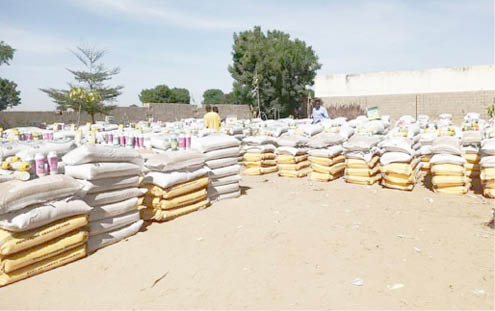Recently, the federal government flagged off the 2023/2024 dry season wheat farming under the National Agricultural Growth Scheme and Agro Pocket (NAGS-AP) project to support 250,000 farmers.
The Minister of Agriculture and Food Security, Senator Abubakar Kyari, said the project has a 50% input subsidy intended to cultivate between 200,000 and 250,000 hectares with an expected yield of 1.2 million tonnes of wheat across the country.
The inputs have been delivered in Yobe State, where each selected farmer received 7 bags of NPK fertiliser, 3 bags of urea, 1 bag of wheat seed 100kg, and pesticide based on the number of hectares.
The total package price of the inputs is N360,000 but the government slashed the price to N180, 500, which is a 50% per cent subsidy for the beneficiaries.
Daily Trust gathered that the intervention is surrounded by many issues ranging from diverting the inputs by some beneficiaries to the black market where the inputs were sold cheaply.
Our reporter gathered that some of these beneficiaries were not wheat farmers.
A wheat farmer, Alhaji Abdulmumini Garba, in Gashua, the headquarters of Bade LGA of Yobe State, lamented that the aim of the emergency declaration on food security in the country by President Bola Ahmed Tinubu and the 2023/2024 dry season wheat farming under the National Agricultural Growth Scheme and Agro Pocket (NAGS-AP) project to support 250,000 farmers have been defeated in Yobe, as the targeted farmers have not been selected.
‘‘The officials, who are vested with the responsibility of ensuring effective and transparent distribution of the commodities to real farmers, have hijacked the process. They either resell or give them to their close allies who in turn sell to the farmers at high rates,” he said.
Daily Trust correspondent, who spoke with the All Farmers Association of Nigeria (AFAN), Yobe State chapter, lamented that even when the government created intervention programmes to support local farmers, the grants or loans did not get to the real farmers in the local communities.
The secretary of the All Farmers Association of Nigeria (AFAN), Bade LGA, Mallam Auwal Hassan, said the distributors of the inputs had not contacted the leadership of the AFAN during the distribution of the farm inputs, adding that diversion and irregularities had happened during the exercise.
‘‘We have seen the bags of fertilisers were stored in one of the stores in Gashua; later on, they distributed them to the selected people; not farmers because the beneficiaries of the intervention are not the real farmers. In short, we as leaders of the farmers have not been contacted or invited to this distribution exercise.
‘‘The information at our disposal shows that this project was meant to provide food security and create jobs as well as the improvement of wheat farming but to be honest with you, this effort of the government has been defeated because the target farmers have not received any inputs from the federal government.
‘‘I have seen input marketers who are buying the inputs from the beneficiaries at the venue of distribution which means the selected beneficiaries are not the farmers. The real farmer will never sell farm inputs no matter what the circumcises are.
‘‘This wheat farm inputs belong to all farmers, especially wheat farmers, hence we as leaders should be contacted on which processes should government follow to make the project effective but you cannot be in Abuja or Damaturu and distribute farm inputs in Gashua, the centre of farming activities in Yobe, without contacting the leadership of the farmers.
‘‘This is not the first time people are hijacking government interventions; even when the government created intervention programmes to support local farmers, the grants or loans do not get to the real farmers in the local communities.
‘‘Therefore, we are calling on the government to review the distribution of these wheat inputs in Yobe because the real farmers of wheat that we knew have not benefited from this project,’’ he said.
In an interview with Alhaji Isa Mai Unguwa, a wheat farmer alleged that farm inputs such as fertilisers, seeds, and chemicals, among others, collected on their behalf did not reach many of them.
‘‘I tried my best to get this intervention for wheat farmers but I couldn’t make it, because in the first place I didn’t even know. Later on, I got information about the programmes and I tried my best but I didn’t know who the leaders of distribution were.
‘‘I have a boss named Alhaji Jabbi. He is a well-known wheat farmer in our area. Any time there is government intervention, government officials handle some inputs to him so that the support will reach the real farmers but this time around he was not consulted,” he said.
When the Yobe State Ministry of Agriculture and Natural Resources was contacted, an employee in the ministry said the inputs were distributed by the staff of the Federal Ministry of Agricultural and Food Security, Damaturu office, adding that it was the responsibility of the federal ministry of Agric to distribute.
Our reporter also contacted Dayyabu Gashua, one of the distributors of the farm inputs, but he neither picked up the calls nor responded to the text message sent to him by our correspondent.

 Join Daily Trust WhatsApp Community For Quick Access To News and Happenings Around You.
Join Daily Trust WhatsApp Community For Quick Access To News and Happenings Around You.


